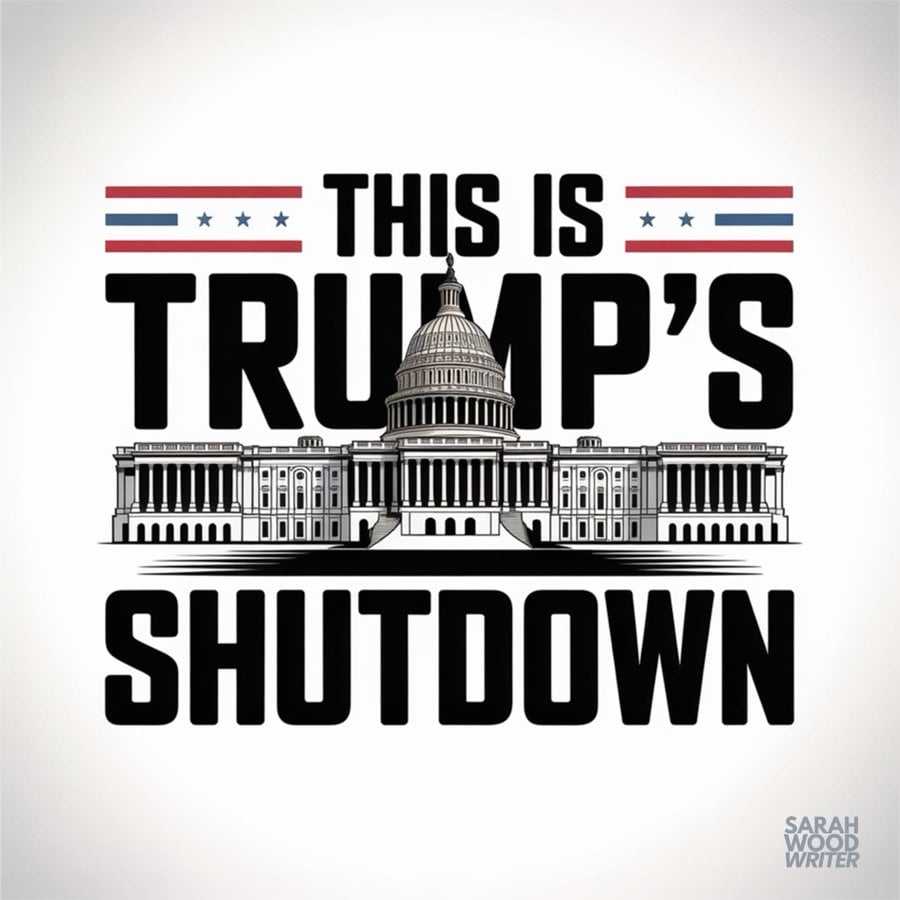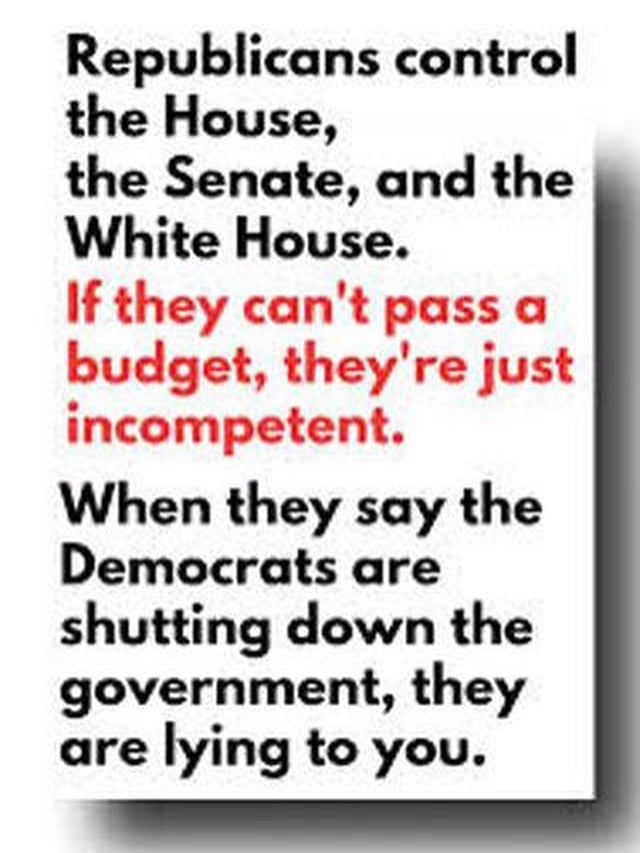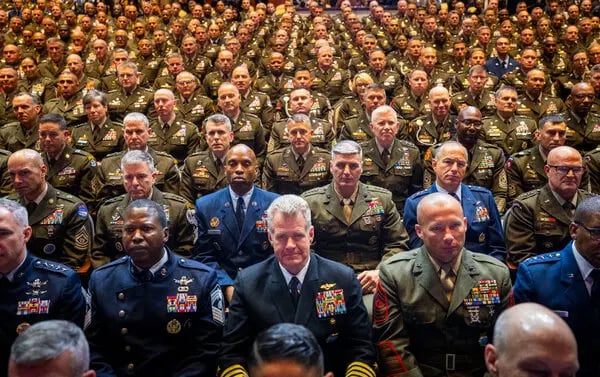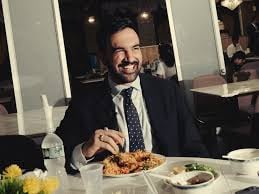Wednesday, October 1, 2025. Annette’s Roundup for Democracy.
The Trump shutdown has begun.

Will it last more than the 35 days that his first one did in 2018-2019?
Millions of federal workers won’t get paid during a government shutdown. But members of Congress will still receive a paycheck. https://t.co/x5clqee319
— NBC News (@NBCNews) September 30, 2025

Trump describes the police state he wants.
At the meeting of Generals in DC yesterday, the Trump Administration described who they are and what they plan to do.
🚨MAJOR BREAKING: Trump says the quiet part out loud: “I'm going to be meeting with generals and admirals and with leaders, and if I don't like somebody, I'm going to fire them, right on the spot."
— CALL TO ACTIVISM (@CalltoActivism) September 30, 2025
This is how authoritarians take control - loyalty first, Constitution last. pic.twitter.com/TuFyK4qVlS
WTF??? Drunk Hegseth just called for the USA to abandon the Geneva Conventions — saying our troops should ignore “stupid rules of engagement.”
— Morgan J. Freeman (@mjfree) September 30, 2025
FYI: Those “rules” were created after WWII to stop WAR CRIMES. Hegseth is defending atrocities on live TV. pic.twitter.com/V8RTvnzLTx
Our troops deserve better https://t.co/bGPFUFfnFL
— MeidasTouch (@MeidasTouch) September 30, 2025
Big OMG https://t.co/ATL72GNec2
— Donna Landry Sexton (@RanchDressingTN) September 30, 2025
Trump: San Francisco and Chicago, New York, Los Angeles… We'll straighten them out one-by-one. It will be a major part for some of the people in this room. It’s a war too. It’s a war from within pic.twitter.com/xt7By0lX6v
— Acyn (@Acyn) September 30, 2025
Trump and Hegseth Recount Familiar Partisan Complaints to Top Military Leaders
The U.S. generals and admirals summoned from around the world had been given little information about the planned event.

More than 800 top military officials gathered in Quantico, Va., on Tuesday.
President Trump and Defense Secretary Pete Hegseth summoned more than 800 of the country’s top brass to a military base in Virginia on Tuesday to voice a familiar litany of culture war talking points and criticize a military that they complained had become distracted by political correctness.
The rare and highly anticipated call-up drew the country’s military commanders, who flew in from Asia, Europe and points between on short notice. The president delivered a rambling address that included familiar talking points and critiques and Mr. Trump’s revelation that he had told Mr. Hegseth to use American cities where he has deployed troops as “training grounds” for the military.
It was unclear why, with a shutdown of the federal government looming, Mr. Trump and his defense secretary needed to gather the country’s senior military leaders from overseas deployments to tell them face to face that they were straight out of “central casting,” as Mr. Trump characterized the gathering.
“I’m thrilled to be here this morning to address the senior leadership of what is once again known around the world as the Department of War,” Mr. Trump said. (Though Mr. Trump has renamed the department, Congress has not yet approved the change.)
Mr. Trump praised his own tariff and border policies and insulted former President Joseph R. Biden Jr. Discussing his efforts to send troops to American cities, he said: “We should use some of these dangerous cities as training grounds for our military.”
Mr. Hegseth spoke first, telling the assembled generals and admirals that he was tightening standards for fitness and grooming, cracking down even more rigorously against “woke garbage” and getting rid of attacks on “toxic” leadership that he said had gone too far.
In his address, Mr. Hegseth railed against what he called “stupid rules of engagement” that he said limited soldiers and commanders in the field. He defended his firing of more than a dozen military leaders, many of them people of color and women.
And he said that, from now on, promotions would be based on merit, complaining that, in his view, they previously were not.
“We’ve already done a lot in this area, but more changes are coming soon,” he said.
It was standard fare for Mr. Hegseth, who will undoubtedly come under criticism for the expense of flying the commanders to the Washington area as a federal shutdown looms. President Trump acknowledged the cost of the gathering as he boarded a helicopter to head to the Marine base at Quantico, where the gathering was being held.
“These are our generals, our admirals, our leaders, and it’s a good thing, a thing like this has never been done before, because they came from all over the world,” the president said. “And there’s a little bit of expense, not much, but there’s a little expense for that. We don’t like to waste it. We’d rather spend it on bullets and rockets.”
The generals and admirals assembled were mostly quiet during the remarks by Mr. Hegseth and Mr. Trump. It is tradition for the military to present a nonpartisan posture.
When Mr. Hegseth summoned the senior officers last week, he gave no reason for the meeting, which has no precedent in scope and scale in recent memory. The military leaders were told to expect a speech from the secretary heralding a so-called war-fighter culture he has championed since taking office, but they were given little other information.
The event took a new twist on Sunday when Mr. Trump said he would attend. That raised alarm among military specialists over his tendency as commander in chief to use U.S. troops as political props and visits to bases as occasions to bash political rivals, Democrats and the news media. During a speech at Fort Bragg, N.C., in June, Mr. Trump led troops to boo journalists and Mr. Biden.
Mr. Trump has sought to downplay the gathering, telling NBC News on Sunday, “It’s just a very nice meeting talking about how well we’re doing militarily.”
In recent weeks, Mr. Trump has ordered National Guard soldiers to Los Angeles, Washington and Portland, Ore., over the objections of local political leaders, to assist immigration efforts and combat crime. He also directed the military to attack boats in the Caribbean that he said were carrying drugs to the United States, but he offered no detailed legal justification.
The top four-star combatant commanders and Joint Chiefs of Staff typically meet at least twice a year in Washington, often holding a working dinner with the president. But the large number of lower-ranking generals and admirals at Tuesday’s meeting was highly unusual, military officials said.
In the days before the event, Democratic lawmakers and military specialists questioned the cost and disruption to daily operations caused by the meeting, as well as the security risks of concentrating so many top military commanders in one place. All, it appeared, for Mr. Hegseth to be able to lecture military leaders with decades of combat experience on an enhanced “warrior ethos” in a forum that was televised live.
“It appears to be one more demonstration of Secretary Hegseth mistakenly believing our military leadership needs to be directed to focus on fighting wars,” said Kori Schake, a former defense official in the George W. Bush administration who directs foreign and defense policy studies at the American Enterprise Institute. (New York Times)
One more thing.
Trump again had fun being racist.
Trump: "We can't let people throw around that word. I call it the N-word. There are two N-words and you can't use either of them." pic.twitter.com/hjOLjBmdXV
— The Bulwark (@BulwarkOnline) September 30, 2025
He has said this at least 3 times before.
February 2023 (West Palm Beach, FL rally)
We have two n‑words, neither of which should ever be mentioned. I said that once and they said ‘oh what a terrible thing to say’ … You know what the one is but the other’s the nuclear word, not supposed to ever be mentioned ever, ever, ever!
March 2019 (Fox News interview with Bret Baier)
The N‑word. You know what the N‑word is, right? ... Yeah … It’s the N‑word [Nuclear].
October 2022 (Truth Social post, rebuking Dmitry Medvedev)
Did I hear … casually throwing around the ‘N word’ (Nuclear!), … The ‘N word’ should not be treated so casually.
The Crimson battle.

On September 3rd, A federal judge ruled that the Trump administration’s attempt to freeze more than $2 billion in federal research grants from Harvard University was illegal.
U.S. District Judge Allison Burroughs said the Trump administration "used antisemitism as a smokescreen for a targeted, ideologically-motivated assault on this country’s premier universities,” and violated the First Amendment, the Administrative Procedure Act and Title VI of the Civil Rights Act, the federal law that bars discrimination on race and national origin. (Source. Politico).
Monday, the Department of Health and Human Services (HHS) referred Harvard for administrative suspension and debarment proceedings. The move could bar the school from receiving any federal funding, including research grants, student aid, and government contracts. Harvard has 20 days to request a hearing before an administrative law judge to appeal the decision. (Source.Business Standard).
Today, we learned “the Trump administration’s move this week to choke off Harvard University’s access to future federal funding came after [bold mine] a scathing letter from the university accusing the administration of relying on shoddy evidence to determine that the college violated civil rights laws by allowing antisemitism to persist on campus.
In a strongly worded, 163-page letter from Harvard on Sept. 19, which has not been previously reported, the university assailed the government’s findings that the college had violated federal civil rights laws. The university accused investigators at the Health and Human Services Department of relying on “inaccurate and incomplete facts,” failing to meet a single legal requirement to prove discrimination and drawing sweeping conclusions from a survey of one-half of 1 percent of the student body.
The stark language was a departure from months of mostly measured tones from Harvard as the university has resisted the administration’s pressure campaign to impose President Trump’s political agenda on the nation’s elite colleges. (Source. New York Times)
Something that will make you smile.
How Zohran Mamdani Built a Campaign Around Food.
The front-runner for New York mayor is leveraging his lifelong love of eating to inform his policy plans and spread his message.

Zohran Mamdani at Kabab King, a 24-hour restaurant in Jackson Heights, Queens, where he has eaten since his high school days
The late-night visit to Kabab King was ostensibly for a campaign interview. But the minute the food hit the table, Zohran Mamdani became lost in the chicken biryani in front of him, digging into the plate with gleeful abandon.
After a few minutes, a light dawned. He looked up and apologized for not sharing. “Sorry,” he said sheepishly. “As you can tell, I’m hungry.”
He continued to apologize throughout the meal at Kabab King, a 24-hour restaurant in Jackson Heights, Queens, that he’s been visiting since high school. The next day, a campaign aide texted her regrets.
The Democratic nominee and front-runner for mayor, Mr. Mamdani is keenly aware how attentive New Yorkers are to how their politicians interact with food, and how judgmental they can be. The former mayor Bill de Blasio was mocked in 2014 for eating a pizza with a fork and knife rather than folded and by hand in the New York style. The current mayor, Eric Adams, faced a similar scolding when he was spotted eating fish after professing to follow a plant-based diet.

Mr. Mamdani finds it harder to eat out now that he’s surrounded by a team of security and aides
But no mayoral candidate’s relationship to food has been more scrutinized or showcased than Mr. Mamdani’s, often by his own choice. A devotee of delis and bodegas who once filmed a music video at Kabab King under the rap moniker “Mr. Cardamom,” he is harnessing food as both campaign tool and policy plank.
Mr. Mamdani — at 33, suddenly one of the most famous faces in American politics — has proposed opening a city-owned grocery store in each of the five boroughs to make ingredients more affordable, and repealing some of the laws and regulations that have curtailed street vending. He has held news conferences at his favorite restaurants, and conducted many press interviews inside them.
And the social-media blitz that has been widely credited for his success often focuses on food. In posts with hundreds of thousands of views, he has framed his central message — making the city more affordable — around specific culinary benchmarks like the rising price of halal chicken and rice, and used Bengali sweets as props to explain ranked-choice voting.
The way Mr. Mamdani references food at “the personal level and the policy level — and his skill in doing it is probably unusual, if not completely new,” said Grant Davis Reeher, a political science professor at Syracuse University.
Others worry that those skills won’t translate to political leadership. “The mechanics of running the city government and the city are far different than the feel-good images you can make on social media,” said Jim Kessler, the executive vice president for policy at Third Way, a think tank run by moderate Democrats. “Governing as an influencer will not work. People need results.”
Food has been a staple of retail politics for as long as candidates have gnawed on pork ribs at state fairs to display a common touch. And as inflation and healthy eating have become hot issues, it’s commonplace to hear campaign speeches about egg prices or artificial food dyes.
Former Gov. Andrew M. Cuomo, who is running as an independent and posts the occasional grip-and-grin photo from a dining room, has proposed subsidies for low-income New Yorkers who don’t qualify for the Supplemental Nutritional Assistance Program. Curtis Sliwa, the Republican, said through a spokeswoman that he would increase the number of businesses that accept SNAP benefits, and “raise school meal standards with fresher, better options.” And before he withdrew from the race on Sunday, Mr. Adams made plant-based meals a priority in the city’s schools and jails.

Mr. Mamdani said that for him, food is less a campaign strategy than it is an instinctual medium for talking to voters
But Mr. Mamdani leverages food in a different, more powerful way, said Adam Bozzi, a Washington-based Democratic political strategist who is not involved with any of the mayoral campaigns.
Food is “part of his language to make his politics really accessible,” Mr. Bozzi said. It’s a background character in his videos, meant to make the setting — and him — feel familiar to voters. “Which is different from the actual food being the event, like ‘I am eating fried butter or the cheesesteak.’ That feels a little more contrived.”
Mr. Mamdani’s focus on street foods and inexpensive neighborhood restaurants serves a bigger strategy: portraying himself as a relatable everyman. And while dropping in at restaurants is nothing new for New York politicians, what is different is the way Mr. Mamdani interacts with the owners, said Basil Smikle Jr., a former executive director of the New York State Democratic Party who is now a professor at Columbia’s School of Professional Studies.
“He uses food in the way that an influencer might,” said Dr. Smikle, “versus a Kamala or JD Vance, where it is a little more structured, a little more organized, a little more scripted. He seems more comfortable engaging.”
Mr. Mamdani says he never set out to build his campaign around food.
Eating has simply been “the way that I understood myself as a New Yorker,” he said. “So many of these moments in my life were ones that I could not separate from food,” like the cardamom chai and a savory snack mix called chevdo that his mother (the filmmaker Mira Nair) served him when the family lived in Morningside Heights, or the momos he later ate for lunch in Jackson Heights when working as a housing counselor.
When he ran for his State Assembly seat during the early months of the pandemic in 2020, Mr. Mamdani turned his campaign office into a food pantry.
He often talks to people about what they eat — like how the classic $1 New York pizza slice no longer costs a dollar. “Food is a very quick way to understand the rising cost of living in the city, because people remember the cost of staples in their lives,” he said.
But if food can make a connection with voters, it can just as easily alienate them. Mr. Mamdani experienced a minor food scandal in March, when he posted a photo of himself on X eating a burrito on the subway. Scores of commenters denounced that as unhygienic and disrespectful to fellow passengers.
He responded with a video in which he said, “I hear you, I see you and if you’re a burrito on the Q train, I eat you.”
He laughed as he recalled the furor. “There were real people who said the campaign was over,” he said. “I was like, ‘Just take a breath!’”

Mr. Mamdani said he always orders the chicken biryani at Kabab King, and asked for a box to take his leftovers home.
The Wi-Fi network for his campaign office is now called “BurritoGate.”
That burrito also signals the types of restaurants where Mr. Mamdani campaigns. When he announced he would reduce fines and fees for small businesses, he did so at the bodega in the Flatiron district where he used to buy his morning egg sandwich. He had lunch and posted a photo with Senator Bernie Sanders and Representative Alexandria Ocasio-Cortez at Sami’s Kabab House, an Afghan restaurant in Astoria, Queens, where he is a regular.
“He respects us and treats us like Michelin-star restaurants,” said Ali Zaman, who runs the Astoria cafe Little Flower — one of the stops on a scavenger hunt the campaign recently led around the city. (The cafe’s name also evokes Mr. Mamdani’s favorite mayor, Fiorello H. LaGuardia.)
While eating at Kabab King, Mr. Mamdani acknowledged that it wasn’t a classic stop for politicians. “Barack, come to Kabab King!” he shouted, then quickly corrected himself: “President Obama, come to Kabab King!”
Visits like this have become more difficult for the candidate. At the start of the year, he could freely run out to grab a smoothie or sit in his favorite Yemeni coffee shops in Astoria, where he lives with his wife, the animator and illustrator Rama Duwaji.
Today, the image of accessibility that helped propel his candidacy is much harder to convey when he is flanked by security and entering restaurants through a back door.

Mr. Mamdani is a regular at Kabab King, and even filmed a music video here.
“If all you do is sit in a detailed car and you’re going around New York City, your world will start to narrow,” he said. He still goes out to eat, but often dines in quiet back areas, and faces away from guests so he’s not immediately recognized.
There was little chance of that at Kabab King, where Mr. Mamdani was trying to finish his biryani. Eventually, he gave up and asked for a doggy bag.
Strolling down 73rd Street, toting a disposable cup of chai and a plastic bag of leftovers, he carried himself like any other Queens resident heading home after a long night. Except for the guards surrounding him, the black S.U.V. he boarded and the crush of people who followed. (Priya Krishna, New York Times).
Speaking of food, tonight at sundown, the holiest holiday of the Jewish Year begins. Yom Kippur involves fasting after sundown today, until sundown tomorrow.
Eve and I will be at services starting this evening, and return on Thursday morning.Therefore, there will be no Roundup tomorrow or Friday.
See you on the weekend, for one or more days.
May you be inscribed in the Book of Life.
Happy, healthy, democratic/Democratic New Year to all.